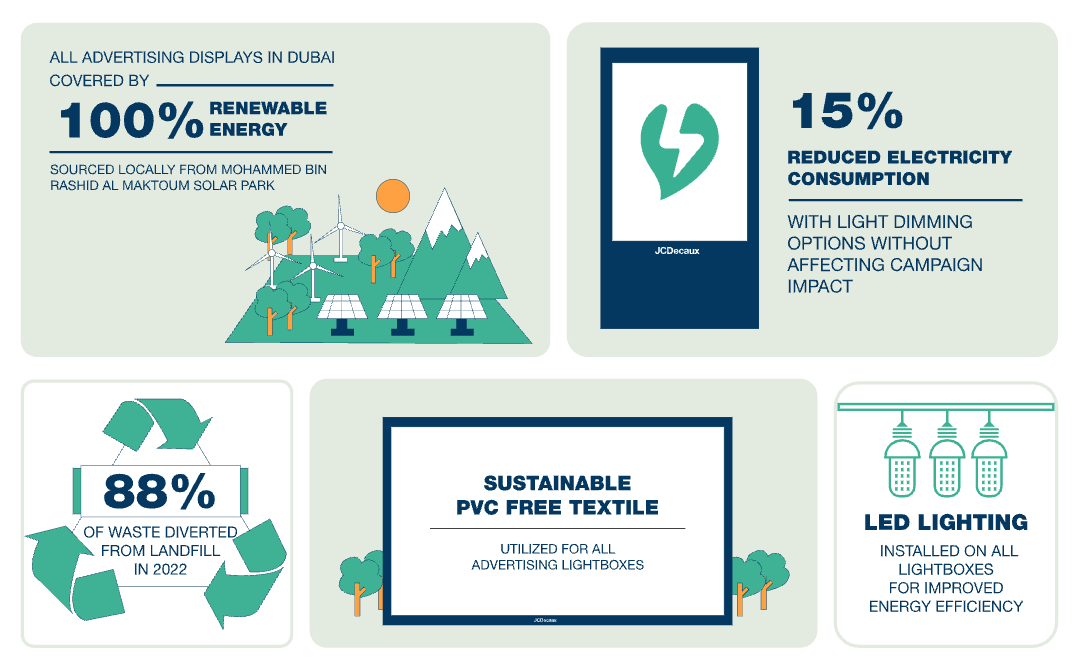
Since its inception in 1964, JCDecaux has placed sustainability and efficiency at the heart of its business model: designing, installing and maintaining infrastructures in public spaces and transport areas supported by brand advertising.
The unveiling of the group strategic 2030 ESG roadmap in 2022 and the Climate Strategy in 2023 was yet another step by the global leader in out-of-home advertising in its continued efforts to achieve a more sustainable and responsible future.
JCDecaux has always acknowledged the importance of sustainable practices and has taken concrete initiatives to place sustainability at the core of their operations across the Middle East region.
The company’s latest major project is to transform, in partnership with Dubai Airports, the advertising landscape of Terminal 1. The ambition is simple: enhancing the passenger journey with the transformation and/or installation of new premium communication platforms while reducing their impact on the environment.
Here are some key initiatives taken into consideration in the company’s operations but more than words and promises, JCDecaux claims deeds and evidence.
TOWARDS A MORE SUSTAINABLE USAGE OF ENERGY
Powering all advertising displays with 100 per cent renewable energy sourced locally
The volume of electricity required to power all its media solutions is entirely obtained from renewable sources at Mohammed Bin Rashid Al Maktoum Solar Park in Dubai, and then transferred to grid. This approach supports the development of renewable energy sources locally and contributes in reducing the company’s carbon footprint.
Installing light-dimming technology to optimise advertising brightness
JCDecaux started upgrading its advertising lightboxes with a more sophisticated design, incorporating a programmable light-dimming technology. This technology enables precise adjustment of brightness levels, ensuring that the branding visuals are illuminated only as much as necessary.
In an environment such as that of Dubai International, which operates twenty-four hours a day, seven days a week, with no possibility of switching-off the media, the company saves an equivalent of four hours per day in electricity consumption by using this technology.
It means that without affecting the quality of the display or the visibility being provided to brands, JCDecaux optimises the brightness of each of its panels, thereby achieving an additional 15 per cent reduction in electricity consumption.
Using cutting-edge LED tiles
JCDecaux consistently embraces the latest technologies to reduce their ecological impact. The sourcing of a new generation of energy-efficient LED tiles replacing the traditional gas light tubes in the airport’s lightboxes, is resulting in a significant reduction in energy consumption of approximately two times. It is important to note that these state-of-the-art LED tiles not only enhance energy efficiency, but also deliver vibrant, eye-catching displays that captivate audiences’ attention.
TOWARDS MORE ECO-FRIENDLY MATERIALS
Sustainable PVC free textile fabric for reduced environmental impact
Another notable change made by JCDecaux is the transition from traditional flex to textile-based materials for their lightboxes. This switch to textile has multiple positive effects:
- Textile-based lightboxes have PVC-free composition. PVC is known for its detrimental environmental effects and the difficulties associated with its recycling.
- Textiles inherently allow more light to pass through than traditional flex materials, allowing the lightboxes to achieve the desired brightness with less power consumption.
- Textile-based lightboxes weigh approximately half as much as their flex counterparts, leading to a substantial reduction in their environmental impact throughout their lifecycle. Production of textile materials requires significantly fewer raw materials compared to their heavier flex alternatives, resulting in reduced environmental footprints in manufacturing and logistics.
TOWARDS MORE WASTE REDUCTION
Recycling previous media asset structures for new media installations
When possible, JCDecaux adopts an eco-conscious approach by reusing the structure of prior media sites for new installations.
The latest iconic digital media solution in Dubai Airport’s Terminal 1 located at the Arrivals Passport Control Area is testimony of this practice. The metallic structures supporting the previous four digital screens were reused and integrated in the new structures installed on site.
JCDecaux Dubai Managing Director, Bertrand Mouraille said: ‘’We believe in the power of advertising to create a positive change. With our ESG initiatives, we aim to set new industry standards for responsible airport advertising, creating a win-win situation for our partners, clients, passengers, and the planet. At the end, we are all stakeholders of a more sustainable world’’.
As ESG considerations continue to gain prominence globally, JCDecaux’s proactive stance has positioned it as a leader within the Out of Home sector. Their initiatives have been continuously recognised and appreciated by several global non-financial rating agencies such as the FTSE4Good index, Carbon Disclosure Project’s (CDP’s), Morgan Stanley Capital International (MSCI) and EcoVadis, where JCDecaux outperforms the industry average rating.
In an era where brands are dedicated to pursuing and accomplishing their ESG objectives, JCDecaux has emerged as an essential media partner.









